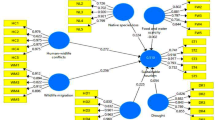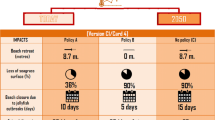Abstract
Climate change could have major implications for the global tourism industry if changing environmental conditions alter the attractiveness of holiday destinations. Countries with economies dependent on tourism and with tourism industries reliant on vulnerable natural resources are likely to be particularly at risk. We investigate the implications that climate-induced variations in Atlantic hurricane activity may have for the tourism-dependent Caribbean island of Anguilla. Three hundred tourists completed standardised questionnaires and participated in a choice experiment to determine the influence hurricane risk has on their risk perceptions and decisions regarding holiday preferences. The hurricane season had been considered by 40 % of respondents when making their holiday choice, and the beaches, climate and tranquility of the island were more important than coral reef-based recreational activities in determining holiday destination choice. Choice models demonstrated that respondents were significantly less likely to choose holiday options where hurricane risk is perceived to increase, and significantly more likely to choose options that offered financial compensation for increased risk. However, these choices and decisions varied among demographic groups, with older visitors, Americans, and people who prioritize beach-based activities tending to be most concerned about hurricanes. These groups comprise a significant component of the island’s current clientele, suggesting that perceived increases in hurricane risk may have important implications for the tourism economy of Anguilla and similar destinations. Improved protection of key environmental features (e.g. beaches) may be necessary to enhance resilience to potential future climate impacts.



Similar content being viewed by others
References
Adger WN, Hughes TP, Folke C, Carpenter SR, Rockström J (2005) Social-ecological resilience to coastal disasters. Science 309:1036–1039
Agnew M, Viner D (2001) Potential impacts of climate change on international tourism. Tour Hosp Res 3(1):37–60
ATB (2009) Official website of the Anguilla Tourist Board. Available at http://www.anguilla-vacation.com/. Accessed 15 November 2009
Becken S, Hay JE (2007) Tourism and climate change: risks and opportunities. Channel View Publications, UK
Bennett J, Adamowicz V (2001) Some fundamentals of environmental choice modelling. In: Bennett J, Blamey R (eds) The choice modelling approach to environmental valuation. Edward Elgar Publishing, Cheltenham
Bennett J, Blamey R (2001) The choice modelling approach to environmental valuation. Edward Elgar Publishing, Cheltenham
Bigano A, Goria A, Hamilton JM, Tol RSJ (2005) The effect of climate change and extreme weather events on tourism. In: Lanza A, Markandya A, Pigliaru F (eds) The economics of tourism and sustainable development. Edward Elgar Publishing
Bigano A, Hamilton JM, Tol RSJ (2006) The impact of climate on holiday destination choice. Clim Chang 76:389–406
Birkland TA, Herabat P, Little RG, Wallace WA (2006) The impact of the December 2004 Indian Ocean tsunami on tourism in Thailand. Earthquake Spectra 22:S889–S900
Boxall PC, Adamowicz WL, Swait J, Williams M, Louviere J (1996) A comparison of stated preference methods for environmental valuation. Ecol Econ 18:243–253
Browder AE (2002) Sand search and beach restoration at Pensacola Beach, Florida. In: Tait L (ed) 15th annual national conference on beach preservation technology, Proceedings. Florida Shore & Beach Preservation Association, Tallahassee
Carlsson F, Frykblom P, Liljenstolpe C (2003) Valuing wetland attributes: an application of choice experiments. Ecol Econ 47:95–103
Carty B, Petty C (2000) Anguilla: tranquil isle of the Caribbean. Macmillan Eductaion Ltd, London
CTO (2005) Caribbean Tourism Organisation, Caribbean tourism performance review. Available at http://www.onecaribbean.org/content/files/2005tourismperformancereview.doc. Accessed 7 January 2010
CTO (2007) Caribbean Tourism Organisation, individual country statistics, 2007 Anguilla. Available at http://www.onecaribbean.org/statistics/countrystats. Accessed 15 November 2009
CTO (2009) Caribbean Tourism Organisation, individual country statistics, 2008 Anguilla. Available at http://www.onecaribbean.org/statistics/countrystats. Accessed November 15 2009
Daye M, Chambers D, Roberts S (2008) Caribbean tourism: new perspectives. In: Dayes M, Chambers D, Roberts S (eds) New perspectives in Caribbean tourism. Routledge, London
Dharmaratne GS, Brathwaite AE (1998) Economic valuation of the coastline for tourism in Barbados. J Travel Res 37:138–144
ECLAT (2000) Anguilla: an assessment of the economic and other damages caused by hurricane Lenny November 1999. Economic Commission for Latin America and the Caribbean, Caribbean Development and Cooperation Committee, United Nations
Eitzinger C, Wiedemann P (2007) Risk perceptions in the alpine tourist destination Tyrol: an exploratory analysis of residents’ views. Tourism Manag 28:911–916
Eitzinger C, Wiedemann PM (2008) Trust in the safety of tourist destinations: hard to gain, easy to lose? new insights on the asymmetry principle. Risk Anal 28:843–853
Emanuel K (2005) Increasing destructiveness of tropical cyclones over the past 30 years. Nature 436:686–688
Field A (2005) Discovering statistics using SPSS, 2nd edn. SAGE Publications Ltd, London
Fish MR (2006) Coastal development and sea-level rise: impacts on sandy beaches and sea turtles. PhD Thesis, University of East Anglia, Norwich, U.K
Gibson H, Yiannakis A (2002) Tourist roles: needs and the lifecourse. Ann Tourism Res 29:358–383
Glenn H, Wattage P, Mardle S, Van Rensburg T, Grehan A, Foley N (2010) Marine protected areas–substantiating their worth. Mar Policy 34:421–430
Goldenberg SB, Landsea CW, Mestas-Nunez AM, Gray WM (2001) The recent increase in Atlantic hurricane activity: causes and implications. Science 293:474–479
Gössling S, Hall CM (2006) Uncertainties in predicting tourist flows under scenarios of climate change. Clim Chang 79:163–173
Hamilton JM, Maddison D, Tol RSJ (2009) Climate preferences and destination choice: a segmentation approach. FNU-working paper 90
Hanley N, Wright RE, Adamowicz V (1998) Using choice experiments to value the environment: design issues, current experience and future prospects. Environ Resour Econ 11:413–418
Hanley N, Mourato S, Wright RE (2001) Choice modelling approaches: a superior alternative for environmental valuation? J Econ Surv 15:435–462
Hayasaka D, Fujiwara K, Box EO (2009) Recovery of sandy beach and maritime forest vegetation on Phuket Island (Thailand) after the major Indian Ocean tsunami of 2004. Appl Veg Sci 12:211–224
Hensher DA, Greene WH (2003) The mixed logit model: the state of the practice. Transportation 30(2):133–176
Hensher DA, Rose JM, Greene WH (2007) Applied choice analysis: a primer. Cambridge University Press, U.K
Holland GJ, Webster PJ (2007) Heightened tropical cyclone activity in the North Atlantic: natural variability or climate trend? Philos Trans R Soc A-Math Phys Eng Sci 365:2695–2716
Houser C, Hamilton S (2009) Sensitivity of post-hurricane beach and dune recovery to event frequency. Earth Surf Process Landf 34:613–628
Hughes TP, Bellwood DR, Folke C, Steneck RS, Wilson J (2005) New paradigms for supporting the resilience of marine ecosystems. TREE 20:380–386
IPCC (2007) In: Solomon S, Qin D, Manning M, Chen Z, Marquis M, Averyt KB, Tignor M, Miller HL (eds) Climate change 2007: the physical science basis. Contribution of working group 1 to the forth assessment report of the Intergovernmental Panel on Climate Change. Cambridge University Press, Cambridge, U.K. and New York, USA
Krinsky I, Robb AL (1986) On approximating the statistical properties of elasticities. Rev Econ Stat 68:715–719
Lepp A, Gibson H (2003) Tourist roles, perceived risk and international tourism. Ann Tourism Res 30:606–624
Lewsey C, Cid G, Kruse E (2004) Assessing climate change impacts on coastal infrastructure in the Eastern Caribbean. Mar Policy 28:393–409
Lindberg K, Dellaert BGC, Rassing CR (1999) Resident tradeoffs: a choice modeling approach. Ann Tourism Res 26:554–569
Lise W, Tol RSJ (2002) Impact of climate on tourist demand. Clim Chang 55:429–449
Maddison D (2001) In search of warmer climates? the impact of climate change on flows of British tourists. Clim Chang 49:193–208
Meheux K, Dominey-Howes D, Lloyd K (2007) Natural hazard impacts in small island developing states: a review of current knowledge and future research needs. Nat Hazard 40:429–446
Mimura N, Nurse L, McLean RF, Agard J, Briguglio L, Lefale P, Payet R, Sem G (2007) Small islands. In: Parry ML, Canziani OF, Palutikof JP, van der Linden PJ, Hanson CE (eds) Climate change 2007: impacts, adaptation and vulnerability. Cambridge University Press, Cambridge
Mukhida F, Gumbs JC (2008) Linking the social with the natural: a socio-economic review of Shoal Bay and Island Harbour, Anguilla. Report by Anguilla National Trust and Anguilla Department of Fisheries and Marine Resources
NOAA (2009) National Oceanic and Atmospheric Administration, National Hurricane Centre. Available at http://www.nhc.noaa.gov/. Accessed 10 November 2009
Rabash J, Browne W, Goldstein H, Yang M, Plewis I, Healy M (2000) A user’s guide to MLwiN. Centre for Multilevel Modeling, Institute for Education, University of London, U.K
Scarpa R, Rose J (2008) Design efficiency for non-market valuation with choice modelling: how to measure it, what to report and why. Agric Resour Econ 52:253–282
Scott D, McBoyle G, Schwartzentruber M (2004) Climate change and the distribution of climatic resources for tourism in North America. Clim Res 27:105–117
Simpson PM, Siguaw JA (2008) Perceived travel risks: the traveler perspective and manageability. Int J Tour Res 10:315–327
Trenberth K (2005) Uncertainty in hurricanes and global warming. Science 308:1753–1754
Uyarra MC, Côté IM, Gill JA, Tinch RRT, Viner D, Watkinson AR (2005) Island-specific preferences of tourists for environmental features: implications of climate change for tourism-dependent states. Environ Conserv 32:11–19
Wall G (1998) Implications of global climate change for tourism and recreation in wetland areas. Clim Chang 40:371–389
Webster PJ, Holland GJ, Curry JA, Chang HR (2005) Changes in tropical cyclone number, duration, and intensity in a warming environment. Science 309:1844–1846
WTTC (2004) The Caribbean: the impact of travel and tourism on jobs and the economy. World Travel and Tourism Council, London, UK. Available at http://www.wttc.org/eng/Download_Centre/#. Accessed 8 November 2009
Young S (2005) Hurricane hazards in Anguilla. Government of Anguilla
Acknowledgments
Thank you to all of the tourists in Anguilla who gave 20 min of their holiday time to participate in the surveys, and to the key informants at Anguilla DFMR who provided invaluable local information. We are also extremely grateful to Ian Bateman and Stephanie Watkins for help with the choice experiment design and to Peter Forster for invaluable help with data-entry. Johanna Forster was supported by a joint studentship from the Economic and Social Research Council and the Natural Environment Research Council (UK). Also thanks to the reviewers of this manuscript for constructive and useful suggestions.
Author information
Authors and Affiliations
Corresponding author
Electronic supplementary material
Below is the link to the electronic supplementary material.
ESM 1
(DOC 45 kb)
Rights and permissions
About this article
Cite this article
Forster, J., Schuhmann, P.W., Lake, I.R. et al. The influence of hurricane risk on tourist destination choice in the Caribbean. Climatic Change 114, 745–768 (2012). https://doi.org/10.1007/s10584-012-0433-5
Received:
Accepted:
Published:
Issue Date:
DOI: https://doi.org/10.1007/s10584-012-0433-5




